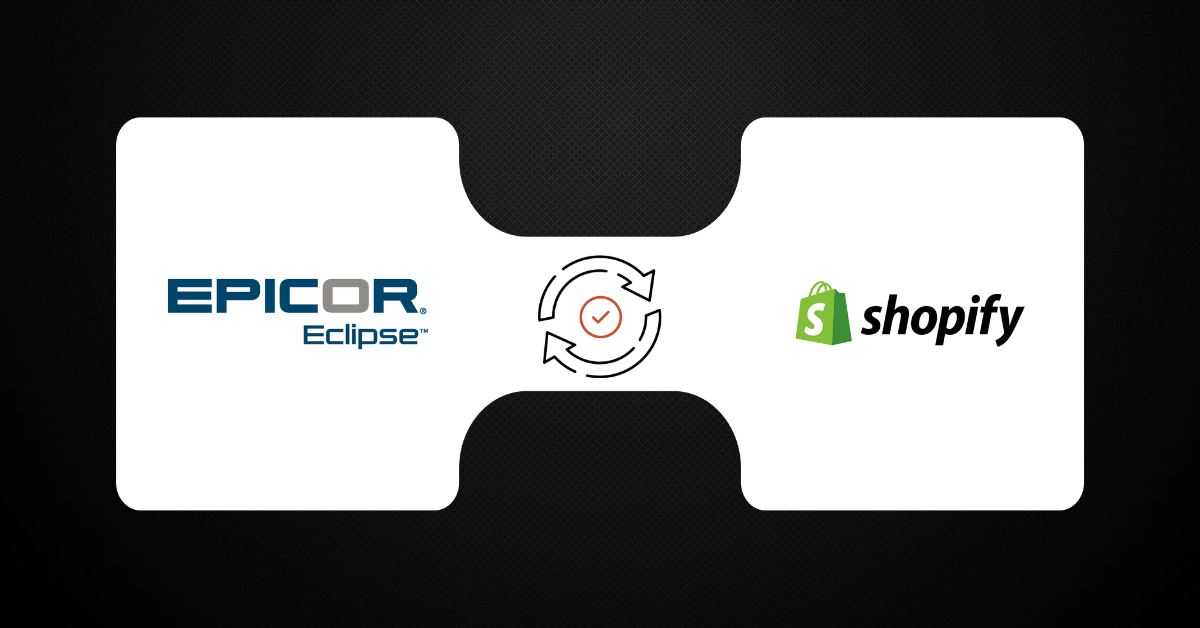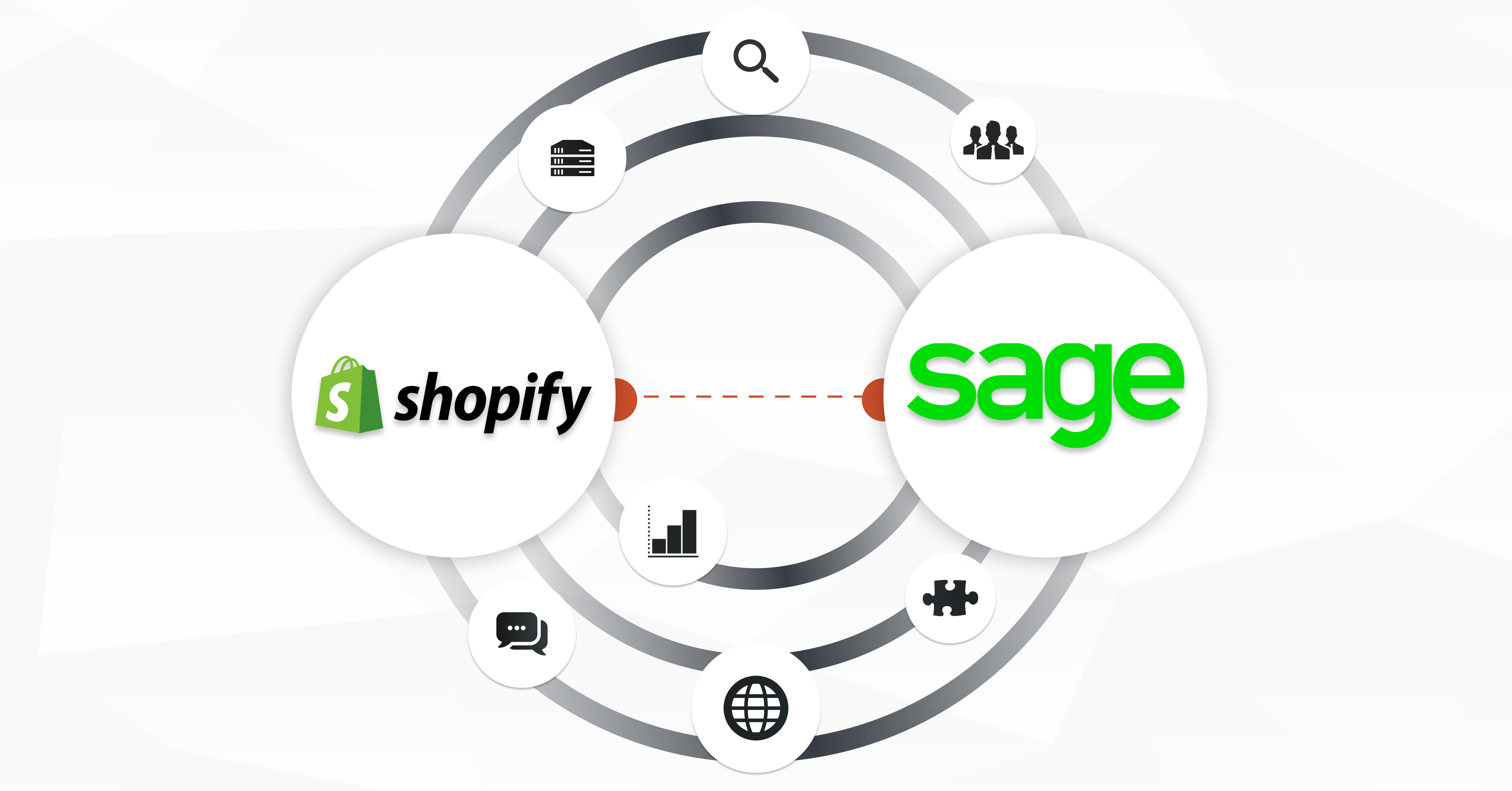Shopify and Epicor Eclipse integration enables businesses to seamlessly integrate their ecommerce platform with their ERP system, allowing them to manage their online sales and inventories in real-time. Both Shopify / Shopify Plus and Epicor ERP solutions are robust platforms that offer a wide range of features and capabilities to organizations. However, in order to fully benefit from what these systems have to offer, they must frequently be integrated.
In reality, an end-to-end integrated approach can save you a lot of money and time that would otherwise be spent on manual data entry and human error. In this article, we will go over the integration procedure between Shopify and Epicor Eclipse, as well as the numerous options available to businesses.
Contents
Methods for Shopify Epicor Eclipse Integration
Custom Integration
Building customized connectors can be a smart alternative for firms with more sophisticated demands or specific requirements. Working with a development team to produce a custom solution that matches the specific needs of the organization is required.
App Store Pre-built Integration Templates
These are the same pre-built applications shared on Shopify’s App store, which makes integration even easier. While easier to set up and more user-friendly, these apps might miss flexibility for very complex business processes. Such problems may happen with scalability and an ability to work with further updates, and, probably, weak customization of options, such that data security and integration might get compromised.
API-Based Integration
Shopify and Epicor Eclipse both offer APIs to enable integration. This is a technical expert-driven approach that provides granular control over how data is passed specifically between the two systems and which integration features will be developed.
Third-Party Platforms
Third-party integration platforms like DCKAP Integrator are specifically designed for distributors. These platforms work at the backend to integrate Shopify with Epicor Eclipse, enabling real-time data exchange. With features like product and inventory management, and customizable integration setups, DCKAP Integrator ensures great stability and improves overall efficiency.
It offers multi-channel integration options, rich reporting, and analytics features, automating the entire order fulfillment process. This improves operational efficiency across ecommerce operations, enhancing customer relationships and highlighting the importance of adopting new systems.
Also read: Best Application Integration Platforms & Tools
What are possible use cases of Shopify Epicor Eclipse Integration?
Depending on the demands of the business, integrating Shopify with Epicor Eclipse might deliver a variety of benefits. Here are some use cases for merging these two systems:
Order Fulfillment
By integrating Shopify and Epicor Eclipse, businesses can automate their order fulfillment process. When a customer places an order on the internet, the system can generate a purchase order in Epicor Eclipse, which can subsequently be used to handle the fulfillment process.
Inventories Management
Integrating Shopify and Epicor Eclipse can assist firms in better managing their inventory. Businesses may ensure that their website and in-store inventories are constantly up to date by syncing inventory data across the two systems, eliminating the risk of overselling or stockouts.
Product Management
By combining Shopify and Epicor Eclipse, businesses can effortlessly manage their products across many channels. Businesses can ensure that the same product information is used across all channels by syncing product data across the two systems.
Customer Data
By integrating Shopify with Epicor Eclipse, organizations may have a more comprehensive view of their customers. Businesses can better understand their customer’s behavior and preferences by syncing customer record between the two systems, which can assist to improve the customer experience.
Reporting and Analytics
Integrating Shopify with Epicor Eclipse can provide businesses with a more comprehensive picture of their sales data, inventory, and consumer activity. It is easier to develop reports and evaluate data to make data-driven decisions when all data is centralized in one system.
Learn more: Fast & Secure Salesforce Epicor Eclipse Integration: A Quick Guide
Benefits of a Shopify Epicor Eclipse Integration
Improved Customer Experience
By integrating Shopify with Epicor Eclipse, businesses may gain a more comprehensive view of their users. Businesses can better understand their customer’s behavior and preferences by syncing customer data between the two systems, which can assist to improve the user experience.
Increased Sales
By giving businesses a more full view of their items and consumers, integrating Shopify with Epicor Eclipse can help them increase sales. This can assist firms in making better-educated decisions on product pricing, promotions, and inventory management.
Improved Efficiency
Businesses can streamline their processes and boost efficiency by merging these two technologies. Businesses, for example, can cut the time and resources required to process and dispatch orders by automating the order fulfillment process.
Greater Data Visibility
By integrating Shopify with Epicor Eclipse, businesses may have a more complete picture of their sales data, inventory, and consumer activity. It is easier to develop reports and evaluate data to make data-driven decisions when all data is centralized in one system.
Improved Automation
Integrating Shopify with Epicor Eclipse can assist organizations in automating a variety of procedures and operations, including order processing, inventory management, and customer data management. This can help to reduce the amount of time and resources needed to manage these duties, allowing firms to focus on growing their operations.
Better Inventory Management
Integrating Shopify and Epicor Eclipse can assist firms in better managing their inventory. Businesses may ensure that their website and in-store inventories are constantly up to date by syncing inventory data across the two systems, eliminating the risk of overselling or stockouts.
Increased Scalability
Integrating Shopify and Epicor Eclipse can make it easier for businesses to scale their operations. Businesses may handle rising sales and customer numbers more efficiently by automating numerous jobs and processes.
What are the common challenges of a Shopify Epicor Eclipse Integration?
Some of the most typical issues encountered while connecting Shopify and Epicor Eclipse are as follows:
- Data compatibility: Ensuring that the data being exchanged between the two systems is in a format that both systems can understand and use.
- Authentication: Creating a secure and dependable method for authenticating people and authorizing access to systems.
- The complexity of integration: Ensuring that the integration is properly configured and that the relevant data is delivered across the systems.
- Scalability is the ability of integration to manage a huge number of data and transactions without experiencing performance difficulties.
- Maintenance entails ensuring that the integration is constantly maintained and updated in order for it to continue to work flawlessly with the most recent versions of the systems.
How do you choose the right Shopify Epicor Eclipse Integration?
When selecting a Shopify-Epicor Eclipse integration solution, keep the following considerations in mind:
- Capabilities for integration: The solution should be able to manage the specific data and functionality that has to be integrated between the two systems.
- Scalability: The solution should be able to handle a huge number of data and transactions while remaining performant.
- Security: To protect sensitive data, the solution should include powerful security measures.
- Ease of use: The solution should be simple to set up and use, especially for non-technical people.
- Flexibility: The solution should be adaptable and customized to your company’s specific demands.
- Cost: The solution should be affordable and offer good value for money.
- Support: The solution should include good customer support as well as documentation to assist you in troubleshooting any issues that may emerge.
- Integration with other systems: The solution should be compatible with other systems you use, such as accounting and inventory management software.
Before making a final decision, it is also advisable to conduct research on various integration options, read reviews, and compare features. You can also seek the advice of an expert or developer to assist you in selecting the best integration solution for your specific needs.
Best Integration Solution for Distributors & Manufacturers — DCKAP Integrator
DCKAP, a leading B2B eCommerce expert, offers a robust middleware platform to seamlessly integrate Shopify Plus with Epicor Eclipse. This low-code integration platform minimizes data duplication and automates manual data entry, allowing you to focus on growing your business.
With extensive experience in developing and enhancing Shopify stores, DCKAP provides a smooth channel for business transactions. Here’s how DCKAP can optimize your Shopify-Epicor Eclipse integration:
- Real-time error detection ensures any issues are promptly identified and resolved, maintaining data integrity.
- Inventory levels are synchronized across both systems, ensuring consistent stock levels.
- When new orders are placed on Shopify, Epicor Eclipse automatically generates purchase orders.
- Shopify customer data is imported into Epicor Eclipse, improving order tracking and customer management.
- Epicor Eclipse order and shipment data are exported to Shopify for automated order fulfillment.
- Automating the movement of financial data between the two systems streamlines financial operations.
Our expertise in connecting Shopify with ERP systems, including Enterprise Resource Planning (ERP) systems and other third-party applications, addresses all your integration challenges. Whether you’re a Shopify user, planning to open a new store, or switching to Shopify from another platform, our solutions offer flexibility, improved workflows, and enhanced revenue potential.
Adoption of new technologies like DCKAP’s ERP Integration Platform ensures robust in-built monitoring and the ability to integrate multiple data sources. Our professionals can also integrate Customer Relationship Management (CRM) systems and Manufacturing Execution Systems (MES), providing comprehensive business solutions with minimal technical knowledge required.
Best Practices For Best Outcomes
- Determine whatever data must be communicated between the two systems. This contains product information, customer information, and sales information.
- Configure the API (Application Programming Interface) connections required for data flow between the two systems. This could include developing bespoke integrations or utilizing pre-built integrations or plugins.
- Test the integration to confirm that data is being transmitted appropriately and that no data compatibility or authentication issues exist.
- Set up any mapping and data transformations that are required to ensure that data is appropriately prepared for use in both systems.
- Set up any necessary routines, such as automated data updates or synchronization, to guarantee that data in both systems remain current.
- Monitor and maintain the integration to ensure that it continues to function properly and that any issues are fixed as soon as possible.
It’s crucial to note that the setup and configuration will differ based on the unique requirements of your integration and the technology you use to link the two systems, therefore it’s best to contact a developer or a professional for this reason.
FAQs
What is ecommerce ERP integration?
Ecommerce ERP integration connects your online store with your Enterprise Resource Planning (ERP) system, allowing seamless data exchange between the two platforms. This integration helps synchronize information such as orders, inventory, customer data, and financials, enhancing overall business operations.
How does this integration affect the supply chain?
Integrating Shopify with Epicor enhances the supply chain by synchronizing inventory levels, automating order fulfillment, and providing real-time updates on order status. This improves overall supply chain management and responsiveness. The integration opens up opportunities for businesses to streamline operations, enhance customer service, and expand into new markets. It enables businesses to manage their ecommerce operations more effectively and make data-driven decisions.
Is this integration suitable for businesses of all sizes?
Yes, this integration is designed to be suitable for businesses of all sizes. Whether you are a small startup or a large enterprise, the scalability and flexibility of platforms like DCKAP Integrator can meet your specific needs and grow with your business.




